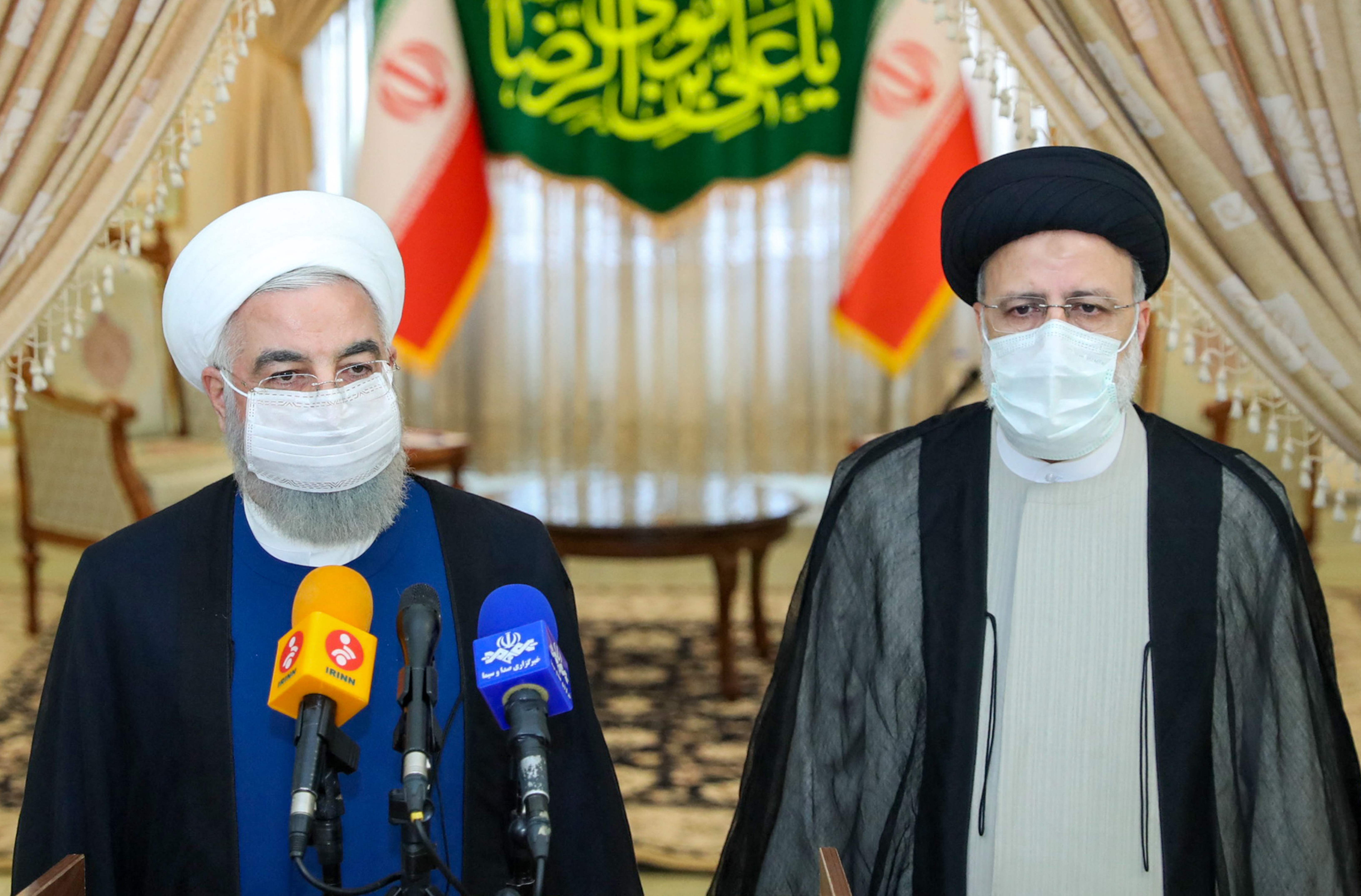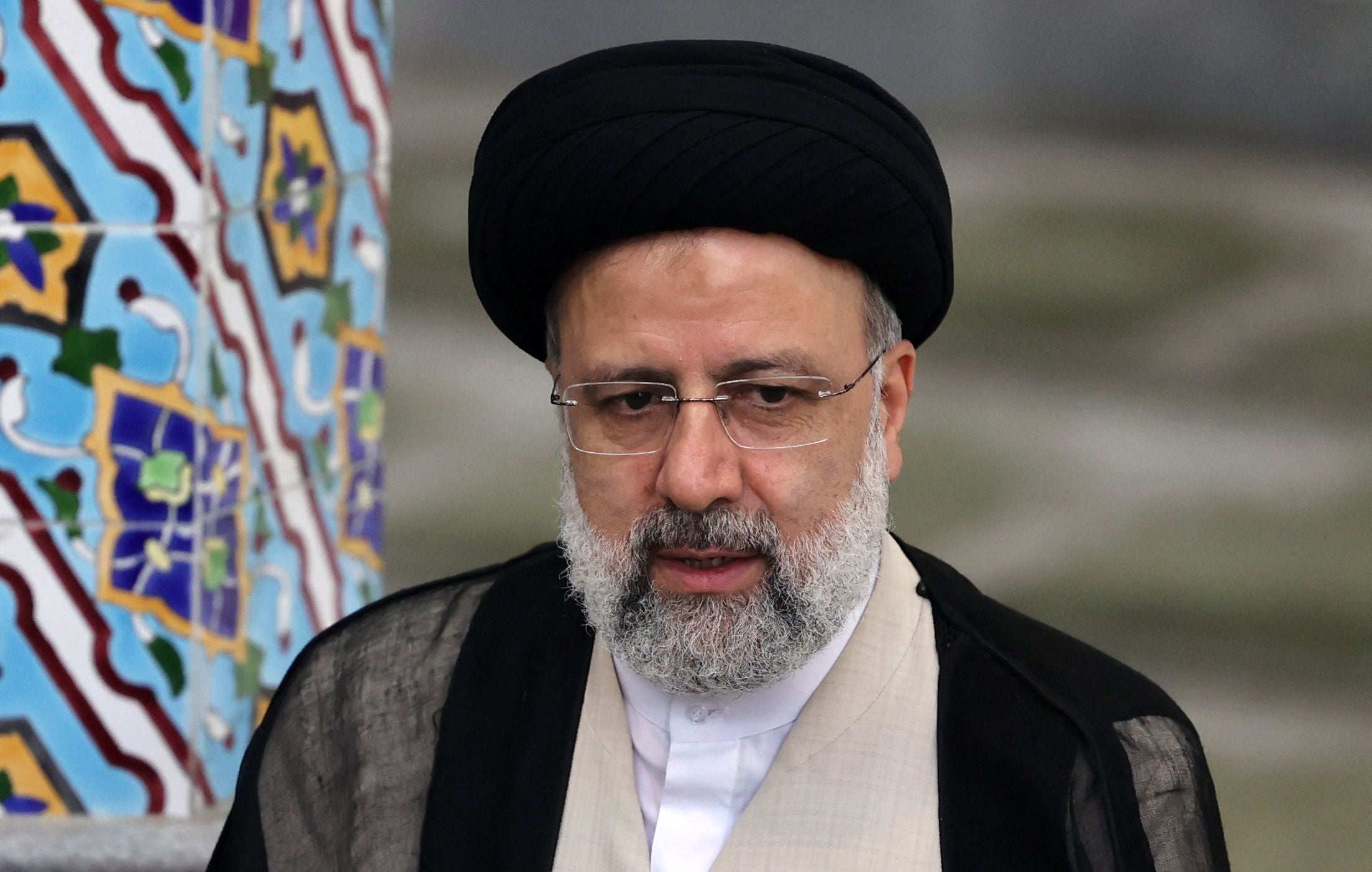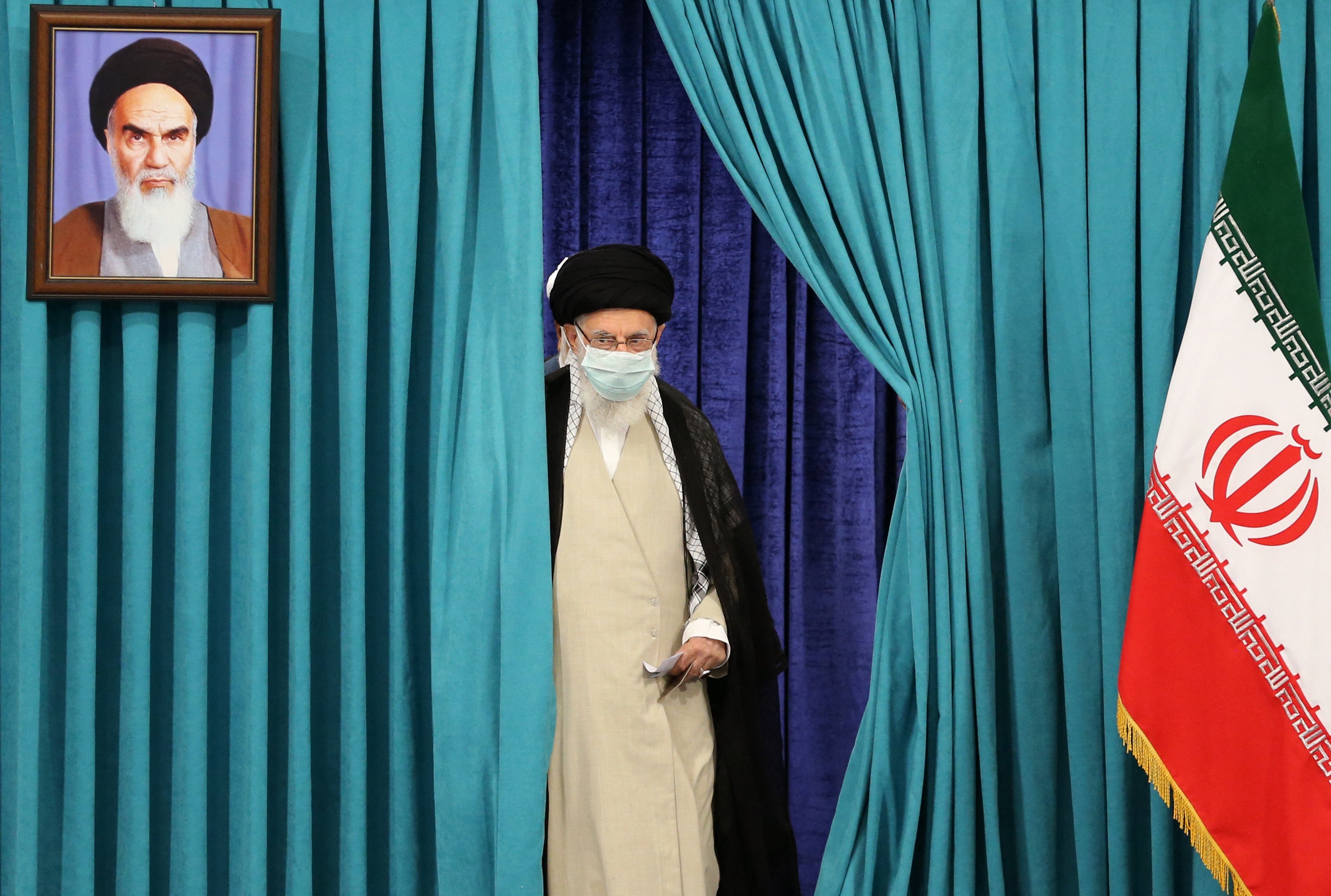‘Puppet’ or president? Propped up by hardliners and the Revolutionary Guard, a new political power emerges in Iran
How Ebrahim Raisi was groomed by the country’s powerful security establishment, from being a relatively unknown judge to being the top elected official

Your support helps us to tell the story
From reproductive rights to climate change to Big Tech, The Independent is on the ground when the story is developing. Whether it's investigating the financials of Elon Musk's pro-Trump PAC or producing our latest documentary, 'The A Word', which shines a light on the American women fighting for reproductive rights, we know how important it is to parse out the facts from the messaging.
At such a critical moment in US history, we need reporters on the ground. Your donation allows us to keep sending journalists to speak to both sides of the story.
The Independent is trusted by Americans across the entire political spectrum. And unlike many other quality news outlets, we choose not to lock Americans out of our reporting and analysis with paywalls. We believe quality journalism should be available to everyone, paid for by those who can afford it.
Your support makes all the difference.He was a relatively obscure judge who had been named by Iran’s supreme leader Ali Khamenei as head of an important religious foundation in the eastern city of Mashhad. But one day in May 2016, two of the regime’s top security officials paid him a visit.
Few details emerged about what transpired in that meeting, between Ebrahim Raisi (who was elected president of Iran on Friday), Major General Mohammad Ali Jafari (then the head of the Revolutionary Guard), and General Qassem Suleimani, the famed commander of Iran’s overseas clandestine forces, who was later killed in a 2020 United States drone strike.
But photos show the two military men, both in civilian garb, seemingly praising and bowing before the black-turbaned Raisi, who was at the time serving as head of the Imam Reza Foundation, one of several religious-themed conglomerates that own and operate huge segments of Iran’s economy.
To close watchers of Iran’s political scene, the unusual choreography was one of the earliest signs that the country’s increasingly powerful security establishment was grooming Raisi, a man mostly known for his role in the mass execution of political prisoners, as its standard-bearer. A year after that meeting, he emerged from a crowded field of hardliners as the main challenger to the moderate president Hassan Rouhani.

“It was a very strange event, because the head of the Imam Reza Foundation is an important religious post but not an important political post,” says Reza Haghighatnejad, a Prague-based expert on Iran’s domestic politics. “The way they sat with Raisi was like the way they sat with Khamenei. Raisi had no specific political identity before that. They elevated him.”
The 60-year-old Raisi will be Iran’s next president, occupying one of the country’s second most powerful positions, elected with more than 60 per cent of the vote after what observers describe as a paltry turnout, accounting for less than 50 per cent of eligible voters. The victory came four years after he lost in a landslide to Rouhani, the departing incumbent. Raisi’s win followed a tepid, meticulously constrained campaign that appears to have been designed to propel the uncharismatic Raisi, who has never held a political post in his life, to the country’s highest elected office.
If you look at his track record, he has very little foreign policy experience, almost no real effective economic management experience
All of this has raised questions about Raisi, his credentials, and what his election means for Iran and its relations with the rest of the world.
“Raisi is probably the least political president the country has ever had,” says one official working for a government organisation in southern Iran. “All of the others had some kind of independent political identity. But he has nothing. He does not have charisma, and is not even a good speaker. He is going to be the puppet, with the real power in the hands of the Revolutionary Guard and supreme leader, who want to execute their plans through him.”
Raisi won’t take office until August, and an agreement to resurrect the 2015 nuclear deal may be hammered out before then via talks taking place in Vienna. Even if the negotiations continue into Raisi’s term, there’s a good chance that Iran will still be interested in returning to the deal. But the emergence of a hardliner with Raisi’s views and reputation raises the stakes for western nations seeking such an outcome. He and his foreign policy team are also likely to be far less interested than their predecessors in the follow-on deals on nuclear technology and regional security sought by the administration of US president Joe Biden, potentially further souring relations between Iran and the west.
Many have speculated that Raisi is being elevated as a potential successor to the 82-year-old Khamenei. But Khamenei and others might see him merely as a loyal placeholder to set the stage for big changes that could solidify the Islamic Republic.
“What Khamenei may have in mind is structural reforms to lay the groundwork for his succession, changes that would reduce friction in the system and put it on a more stable footing,” says Ali Vaez, Iran expert at the Crisis Group, a conflict-resolution advocacy group.
Among the ideas being considered might be doing away with the post of a popularly elected president with a national standing, who could challenge the supreme leader. “He believes the system is unstable for whoever is his successor,” says Vaez. “To make changes he needs to have a pliant president.”
Raisi may be the ideal vessel for the ambitions of hardliners. Born to a conservative family in eastern Iran, he studied theology at the seminaries in Qom. He was a teenager when Islamist clerics and students hijacked the country’s popular revolution and established Iran as a theocracy, but he quickly became an enthusiastic participant in enforcing the vision of Ayatollah Ruhollah Khomeini, the founder of the Islamic Republic.

At 21 years old, Raisi began serving as a prosecutor, pursuing politically charged cases in the cities of Karaj and Hamadan. He gained a reputation as one of the regime’s most severe figures – a young, brash ideologue, willing to get his hands dirty.
“Last night an older friend recalled how, during the late 1980s, Raisi would fly from one prison to another throughout the country and order the execution of a list of political prisoners and then another,” the London-based scholar Eskandar Sadeghi wrote on Twitter. “As he was speaking, I knew he was talking about the fate of some of his dearest friends.”
Within a few years, Raisi was appointed as a judge, a rapid rise that was stunning to Iranians and led to years of questions about his professional credentials. He once described himself on his website as an “ayatollah”, the highest rank among Shia clerics, before changing the description to the much more modest “hojatolislam” after attracting criticism.
“He studied four years in the seminary, and was immediately a prosecutor in Karaj and reached the point of judge,” says Mohammad Javad Akbarin, a former seminary student in Iran, now a Paris-based dissident. “How did he travel the distance from student to judge? When did he finish his studies? Are the books under his name written by him or not?”
In 1988, Raisi, along with three other hardline clerics, served on the “death commission” that allegedly oversaw the mass execution of thousands of political prisoners – many of them members of the outlawed leftist Islamist Mujahedin-e-Khalq organisation – in Tehran’s Evin Prison. Human rights organisations have raised grave concerns about the killings 33 years ago and Raisi’s alleged role.
He’s repeatedly defended the 1988 executions. Many have stayed quiet or even criticised them. In 2009, he defended the execution and jailing of protesters
The killings were a grave crime; those executed had already been tried and sentenced. But to Iran-watchers, what’s most relevant now is Raisi’s current take on the killings, and what it says about his political orientation.
He defends the executions vigorously, even as other regime insiders remain silent or describe them as part of a regrettable period of post-revolutionary excess. He also repeatedly and venomously denounced massive 2009 protests against the outcome of presidential elections, and praised the subsequent violent crackdown that included torture and killings.
Raisi is married to the daughter of Ahmad Alamolhoda, Friday prayer leader in Mashhad and one of the regime’s most hardline clerics.
“You can see he’s a hardliner and radical,” says Haghighatnejad. “He’s repeatedly defended the 1988 executions. Many have stayed quiet or even criticised them. In 2009, he defended the execution and jailing of protesters.”
Raisi’s role in human rights violations prompted the United States to sanction him in 2019. But the fact that he himself is implicated in alleged crimes against humanity must be reassuring to regime enforcers with blood on their own hands, who fear they would have to face justice for their crimes. If the ship goes down, Raisi goes down with them, unlike former presidents such as Mohammad Khatami, a former culture minister, or even Rouhani.
“They were executed even after they were already sentenced,” says Akbarin, who himself was a dissident cleric and political prisoner in Iran. “The court had given them sentences and they were completing them, and they killed them anyway.”
Though he claims to be a religious scholar, Raisi spent much of his career not in the noted seminaries of Qom or Mashhad, but in Tehran at the feet of Khamenei, listening to his weekly lectures, where he is believed to have cultivated his ties to the leadership just as Khamenei fashioned himself as a disciple of Khomeini. He served as the deputy chief of the judiciary, as general prosecutor, and as head of a court trying clergy, during a dark period that saw severe crackdowns on dissidents and the censoring of the internet and other media.
After losing the presidency to Rouhani, Khamenei – in an act viewed as being in defiance of public will – elevated Raisi to the head of the judiciary, shoving aside the more learned and experienced Sadegh Larijani, who is a scion of a powerful and well-connected clerical family.
“If you look at his track record, he has very little foreign policy experience, almost no real effective economic management experience,” says Vaez. “His background is mostly in the judiciary, with the exception of the Imam Reza Foundation. He has very limited experience in management.”
But for Raisi, a lack of experience hardly matters. It was his unflinching loyalty to hardliners that elevated him. One Iran expert said a number of politicians are already reaching out abroad to explore possible exile, fearful of Raisi’s wrath.
Join our commenting forum
Join thought-provoking conversations, follow other Independent readers and see their replies
Comments